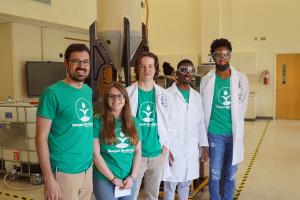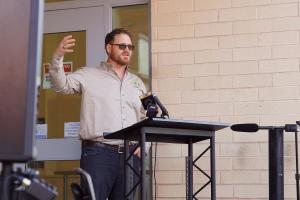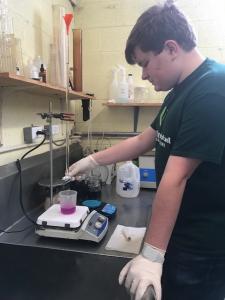Green Energy Biofuel, Blythewood High School Revive Student Interest in Biodiesel Education, Training

Blythewood High School chemistry teacher Will Epps, left, and a handful of his biodiesel students at the Bengal Biodiesel Lab grand opening on National Biodiesel Day March 18. (Photo: BHS Journalism)
South Carolina-based recycling firm Green Energy Biofuel continues its long history of helping schools and students prepare for the energy economy of tomorrow.
WINNSBORO, SOUTH CAROLINA, USA, August 16, 2022 /EINPresswire.com/ -- Two Citadel alumni from South Carolina—BioJoe Renwick, co-founder of Green Energy Biofuel, and Will Epps, a Blythewood High School teacher—are reviving enthusiasm over biodiesel among today’s youth, helping shape the next generation of renewable fuel experts.
The Bengal Biodiesel Lab at Blythewood High School in South Carolina opened its doors March 18—National Biodiesel Day—for the world to see. Just the second of its kind in the country, the program is preparing high-schoolers for university-level research, internships and careers in renewable fuels, organic chemistry and beyond.
The journey for Epps began a few years ago when he found biodiesel-production equipment at the school. “I learned BioJoe had donated it previously,” Epps says. “They had a course in place years ago but nothing like we have now. We retooled the system and designed the course and lab to make biodiesel and perform all the analytical tests—all the basics for an entry STEM-level career that would be useful for the students.”
Today, the biodiesel course is an option for juniors and seniors taking chemistry. “They work one and a-half hours in the lab every day,” Epps says. “They get over 100 hours of lab experience throughout the semester, which is great for their résumés. It helps them get internships.”
The school can turn used cooking oil from restaurants, county collection sites and Green Energy Biofuel into 150 gallons of biodiesel a week. Epps plans to establish a grease drop-off center at the school with Green Energy Biofuel’s help. The biodiesel made from recycled oil powers a school tractor, but eventually the entire school-bus fleet may run on their homemade fuel.
“I help show the kids what is possible,” Epps says. “They’re excited to use their hands and make product. That’s incredibly important for them—to take a class and work toward something.”
Renwick and Green Energy Biofuel have been “instrumental in getting us this far,” Epps says. “He has such a depth of knowledge in this. I’ve learned a lot from him. He’s really helped me—and the students. It’s all about the students.”
Renwick and his company are no strangers to students and school programs. “We’ve been helping schools for 14 years,” Renwick says.
In the late 2000s, when he and his former business partner founded Green Energy Biofuel, then called Midlands Biofuels, they had young men and women from the University of South Carolina and Clemson University working to help build their first plant in Winnsboro, South Carolina, through a state STEPs-to-STEM program.
“Before we had our first tank plumbed, we had three students working for us,” Renwick says. “Our growth was spurred by having interns working for us, creating something from nothing. We wouldn’t be where we are if it weren’t for that program, and the students. We’ve had way over 100 interns coming through our doors.”
In 2012, Blythewood High School received grant funding that paid for Renwick and his company to build a custom biodiesel processor. Renwick also built biodiesel systems for other local schools. Soon afterwards, the Blythewood program went dead.
But a few years later, Epps found the equipment and decided to rehabilitate it, making a few process tweaks on his own.
“Then he found out about me,” Renwick says. “We started giving him all kinds of stuff—thousands of dollars in process equipment to build a new system.”
Renwick says Epps’ revival of the program renewed his own interest. “Once Will got involved, everything changed,” he says. “He’s so passionate. He researches things on his own, and then he’ll call me with really good questions. His enthusiasm got me fired up, and with him being a Citadel graduate like I am, it’s really cool. He’s a very inspirational teacher. All these years I’ve been trying to teach kids through our Bio4Edu program, hiring interns, working with schools—and Will is finding grant opportunities I didn’t even know existed.”
Tyler Carroll, who graduated from Blythewood High School this year and interned at Green Energy Biofuel’s Winnsboro plant this summer, says he loved the biodiesel program so much that he took Epps’ chemistry class twice. “If I could take it again, I would,” he says. “It gave us industry-level skills we could use right out of the gate.”
After Epps’ training, Carroll was comfortable analyzing grease samples collected from restaurants by Green Energy Biofuel. The internship opened his eyes to new aspects of the field too. “I’m also learning more about clean fuels, taxes and business in general,” he says.
Epps’ class and the Blythewood biodiesel program are the reasons Carroll wants to study chemistry in college. He starts at Lander University this fall and plans to transfer to Clemson eventually.
“This is the first time I’ve hired a trained high-school student,” Renwick says. “I’ll hire any one of them from Will’s program.”
Renwick’s goal all along has been to help train high-school and college students and then, once they were “bit by the biodiesel bug,” just maybe they would come back and put their skills to use for Green Energy Biofuel and the communities in which it operates.
“The difficult thing is, somewhere along the way people stopped caring,” he says. “Those types of programs are fizzling.”
Now, with Epps, Blythewood High School and the Bengal Biodiesel Lab, a renaissance in biodiesel education and training is in the making in South Carolina.
This fall will be big for Epps and the Blythewood biodiesel program. Previously, 10 students would occupy one or two classes. This spring, 85 students were already signed up for the fall.
“I’m hoping to have three full sections,” Epps says. “It’s going to be awesome. I absolutely see this growing. We’re not done—we’ve only just begun.”
BioJoe Renwick
Green Energy Biofuel
+1 803-718-6323
Legal Disclaimer:
EIN Presswire provides this news content "as is" without warranty of any kind. We do not accept any responsibility or liability for the accuracy, content, images, videos, licenses, completeness, legality, or reliability of the information contained in this article. If you have any complaints or copyright issues related to this article, kindly contact the author above.


